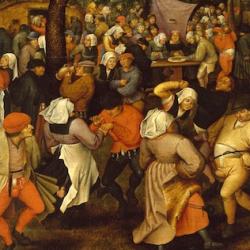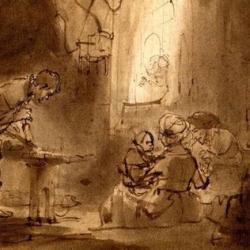Every wedding is a liturgy. Note, I didn’t say: Every wedding has a liturgy. Or, Weddings tend to take liturgical form.
Rather: Every wedding is a liturgy. Not only weddings like this one, with formal dress, dignified processions, pre-scripted words and prayers, gorgeous music, dialogue between minister and people.
Not only Christian weddings. In traditional Welsh weddings, the bridegroom and his attendants fight to capture the bride, and even when the couple is on the way to church, the bride tries to escape and the groom has to catch her. In some parts of France, the groom once had to answer riddles at the door of the bride’s home to convince her family of his worthiness. Among the Ganda tribe in what is now Uganda, groomsmen scatter glittering shells on the ground, and while the bridesmaids are distracted picking them up, the men kidnap the bride.
Specifics vary. Mock battles, riddles at the gate, abduction; or, in our case, a white dress, tuxedoes, flowers and rings, food, drink, and dancing. These are but the trappings and suits of joy.
Through all the variations, every wedding is a liturgy, a ritual of separation, transition, and incorporation. Liturgy isn’t a form for an event that is essentially non-liturgical. A wedding is liturgical in its essence.
At every wedding, both the bride and groom change places; both pass from one status to another. You began the liturgy of your wedding when you decided to separate from your families to form a new family. This morning, you entered from opposite ends of the church, each crossing the threshold into this space between, this space where you’re not yet married and no longer not-married, but are being-married. After you’ve taken vows and exchanged rings, when you’ve prayed and sung and received the blessing of God, you’ll leave together, a new household, joined in one flesh. Your lives have been single melodies, but from this day forward, because of the liturgy of your wedding, your song turns polyphonic.
Psalm 45, the Psalter’s epithalamion, the Psalter’s wedding poem, displays the intricate tapestry of the wedding liturgy. The court poet begins a war song, with the king a “mighty man” girded with a sword, mounted in majesty, shooting arrows as enemies fall beneath him. As soon as he begins fighting, the scene changes. He’s no longer mounted on his warhorse but seated on a throne; he holds a scepter in place of sword and bow. The warfare is over, the battle won, and he enjoys Sabbath victory. Because he’s fought for truth, meekness, and justice, because loves justice and hates wickedness, he’s anointed with the oil of gladness. His garments breathe out spiced aromas, and the hall is filled with the song of his wedding feast.
That’s the liturgy of the king: First battle, then victory, then enthronement with the covenant-celebration of marriage. The king moves from rest to battle to the enhanced rest of wedded victory. He goes out to the uncertain in-between of the battlefield so that he can take his throne and bring in his bride. His wedding is a liturgy of coronation.
For her part, the Bride begins in her father’s house, and with her noble ladies she moves to the king’s palace, where she takes her station at the king’s right hand, adorned with gold. Her liturgy is a procession from an old home to a new one.
For both king and queen, the liturgy effects not only a transition in space, but in time. The king’s Sabbath enthronement isn’t the end of time, but the beginning of a new time, a time of abundance and peace. As she leaves her father’s home, the Bride is exhorted to forget, to put the past of her father’s house behind her. She sacrifices the past to secure a fruitful future: In place of fathers she’s promised sons (v. 16). A daughter of kings, she’ll be the mother of princes. For her sacrifice of forgetting, she receives the reward of memory: “I will cause your name to be remembered in all generations. Therefore the peoples will give you thanks forever and ever” (v. 17).
Every wedding is a liturgy because every wedding is a transition from an old to a new place. Every wedding is a liturgy because it’s a transition from old to new time.
But we have to reach deeper. Every wedding follows this pattern because the divine wedding, the archetypal wedding, the wedding that’s the Alpha and Omega of all weddings, is just this liturgy. According to Hebrews 1, that’s what Psalm 45 is about. It records not merely the words of an ancient poet, but words about the Father’s gift to the Son, spoken through the Spirit, the bard of the Triune court. “You have loved justice and hated wickedness, therefore God, Your God, has anointed you with the oil of gladness above your fellows” – those words are spoken “to the Son” by the Father’s Spirit.
We could have known that from the Psalm alone, because the king follows the footsteps of Israel’s God, battling His enemies, taking His throne, making covenant at Sinai. The Bride is Israel, who leaves behind the old leaven of Egypt, is adorned with gold-embroidered robes, takes her stand as a priest before her new Lord. We could have known it from the echoes of Psalm 45 in our reading from Revelation: When we see Jesus the Bridegroom, He’s mounted on a white horse, mowing down enemies with the sword that comes from his mouth. And then we see the Bride descend from the Father’s house in heaven to become the earthly palace of the Lamb.
Because Psalm 45 is the liturgy of Jesus’ wedding, it’s the liturgy of your wedding. And it must set the pattern of your entire marriage.
Today is your coronation and enthronement. Today, you take your seat as king of a new home, but your battles are far from over. Every day you must retrace the liturgy of this day, in a daily routine of departure, battle, and return; a weekly round of conquest and enthronement, of labor and Sabbath. Each day, you must take the armor and weapons of God to fight for truth, meekness, and righteousness, to love righteousness and hate wickedness, to let grace pour from your lips, to live out of the anointing of the Spirit, to make the scepter of your rule, in your home and elsewhere, a scepter of uprightness.
To the bride: today you move to a new place and begin a new time, but every day of your marriage will be a procession from past to future, from the fathers who came before to the sons and daughters who will come after. Your place is with your husband – not just today, but every day until death parts you. Every day, you are called to follow the example of Sarah to honor Chris as your lord, humbling yourself to be exalted at his right hand.
Psalm 45 envisions the conquest and marriage of King Jesus, who fought the devil and death and overcame the grave to rescue His bride, who’s now enthroned at the right hand of His Father, who gives us, His Bride, a share of the glory of the heavenly court. Through today’s wedding liturgy, you take on those roles, you begin to occupy the space of Jesus and His church, you are called to move from the past into God’s own future. You are called to live out what you do any say today.
May the liturgy of this day become the liturgy of your life together.
In the Name of the Father, and of the Son, and of the Holy Spirit. Amen.










